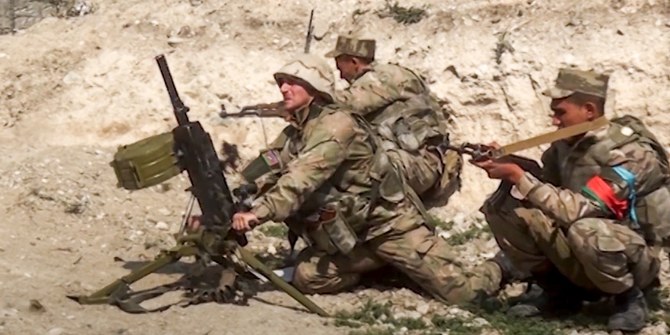
- ARAB NEWS
- 18 Jul 2025

When the most recent fighting broke out in Nagorno-Karabakh, many were quick to take sides. Stepping back from emotions, a century of history is woven into the interaction between the various players: Azerbaijan, Armenia, Tukey, Russia, European nations and the US, with oil and gas thrown into a complicated mix.
Its roots may be traced back to a century ago, when Joseph Stalin declared Nagorno-Karabakh an oblast, or autonomous administrative unit, within the Soviet Republic of Azerbaijan. Conflict between Azerbaijan and Armenia has been simmering and at times erupting since the collapse of the Soviet Union, when Armenia claimed Nagorno-Karabakh but it was legally determined to be an autonomous region inside Azerbaijan. It declared in 1988 that it wanted to unite with Armenia, which Azerbaijan vetoed. Various skirmishes and wars led to about 230,000 ethnic Armenians and 800,000 ethnic Azeris being displaced.
After the biggest clashes in the mid 1990s, Russia brokered a cease-fire, and the Organization for Security and Co-operation in Europe (OSCE) Minsk Group has been trying to mediate ever since. It would be easier to deal only with the two combatants; alas, Russia Turkey the US and oil are part of the equation.
The presidents of Azerbaijan, Turkey, Georgia, Kazakhstan and Uzbekistan, witnessed by a supportive US, signed a declaration in 1998 for the Baku-Tbilisi-Ceyhan pipeline to bring oil from the Caspian Sea in Azerbaijan to the Mediterranean port of Ceyhan in Turkey, circumventing the Bosphorus. Wary of the simmering conflict between Azerbaijan and Armenia, the pipeline took a northern route through Georgia, circumventing Nagorno-Karabakh and Armenia, which considerably increased the price of the project.
Turkey was happy to secure energy supplies and to put itself into geopolitical pole position. BP was the main principal among Western oil companies. The US favored any project that diversified energy supplies to Europe away from Russia. The project had its pitfalls as well, especially when the Georgian president Mikheil Saakashvili demanded more money just before first oil was to flow westward. Since 2007, the South Caucasus pipeline has transported gas from Azerbaijan to Turkey, running parallel to Baku-Tbilisi-Ceyhan.
The economic and political interests are convoluted. Russia always supported Armenia. However, Armenian Prime Minister Nikol Pashinyan is not as close to Russia as his predecessor was. Armenia does, however, still receive Russian weapons at a discount, which does not prevent the Kremlin from selling its weaponry at full price to Baku.
The world community as a whole has no interest in a further conflict spiralling out of control, especially not while it needs to deal with a coronavirus pandemic.
Cornelia Meyer
When hostilities broke out, Turkey immediately sided with Azerbaijan, which is a fellow Turkic and Muslim country, as well as a supplier of energy and therefore a strategic business partner.
Turkey’s history with Armenians does not make the situation easier. Between 1915 and 1924 the Ottoman empire expelled and killed 1.5 million Armenians, in what the international community labelled a genocide. This is not something Armenia will ever be willing to forget and it represents considerable historical baggage, complicating the situation further.
While Russia sides in principle with Azerbaijan, it is not quite as clear cut as that. Overall Russia’s resources are stretched amid the pandemic and Moscow is not really looking for another conflict with its southern neighbor Turkey, who already stands on opposite sides in Syria and Libya. This goes a long way to explain why Moscow is eager to mediate.
The US is divided. While Armenians are successful in lobbying Congress, Azerbaijan and big oil tend to carry some weight in the executive branch, especially under the current administration.
Where does this leave us in respect to the conflict? It is important to mediate between the parties. French president Emmanuel Macron and German Chancellor Angela Merkel have tried to do so. The OSCE is certainly the right multilateral framework to tee up structured talks.
The EU cannot ignore the goings on in what is its near neighborhood. Europe’s relationship with Turkey is close to breaking point. However, the EU has every interest in diversified oil and gas supplies, for which it needs Turkey. More important, it needs Ankara when it comes to refugees: Let us not forget that Turkey houses more than 3 million Syrian refugees against a promised 6 billion euros from Brussels. Closed borders between Turkey and Greece are the only thing standing between these refugees and the Balkans route. During last week’s summit the EU had strong words for Turkey’s activities in the Mediterranean. It decided to take a two-tracked approach between potential sanctions and offering a chance for closer co-operation — leaving Ankara to chose the course of action.
It is difficult to apportion blame, because the situation in the Caucasus is not black or white, and neither of the adversaries is exactly on the side of the angels. A century of history between the parties complicates the situation further. One thing is for certain, though; the world community as a whole has no interest in a further conflict spiralling out of control, especially not while it needs to deal with a coronavirus pandemic.